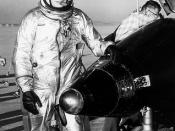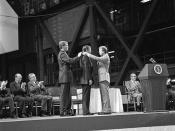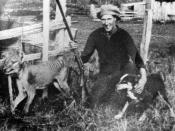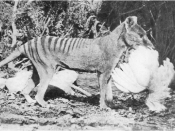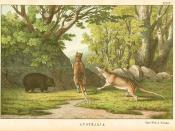In her novel, Julia Leigh has constructed the main character with point of view, setting and characterisation with use of descriptive language to expose the novels underlying values and attitudes. The protagonist develops and transforms throughout the landscape of the novel. "M" is an immoral and destructive being who has no respect for the living; his mission is to hunt and kill the last remaining Tasmanian tiger for a profit making enterprise.
Julia Leigh uses limited third person point of view and stream of conscious narration to give us a unique insight into this mans compelling and compulsive nature. We immediately gain an initial impression of M's character; our first reading of him is of someone who perceives himself as superior, "Martin David, Naturalist", he hides his real identity for unknown reasons. It is also explicit early on that M is a precise and self directed character, "he will drink his tea and assess his situation".
This is a calculated and approach to his task. M is also an anti social man with numerous references to his distaste for human contact, "He too smiles, nods, and then turns to leave before she can start to ask questions". His anonymity is also reinforced as he is so eager to depart before being questioned.
Julia Leigh's construction of M relies heavily on the setting. His mood is directly affected by his ambient setting, his ascent to the peaceful plateau contrasts with his murderous mission to take the life of the thylacine. The ascent inversely affects his mindset as he descends into an animalistic mentality. He physically alters to match his environment also. "Where it is steepest he scrambles on all fours like a cat", his state of mind turns instinctive, similar to that of a predator. "Now M is the natural man, the man who can see and hear and smell what other men cannot". Upon Ms return to the Armstrong family his transition into an emotional state is made, as his affection for the Armstrong family grows, he becomes more and more an emotional being, up until the point where he deliberates about settling down with the family. When he discovers the burning incident he becomes depressed and insane with disappointment. He begins to believe the world has conspired against him, "I have been forsaken, he thinks, the world conspires against me... I did not ask for much... and still I am denied". He feels sorry for himself and contemplates aborting the "mission". He decides to return to the plateau. He begins to forget the Armstrong family as he once again descends into "The natural man". "He comes to think of his fondness for Lucy and the children as an aberration, a monumental lapse of judgement, and his vision of growing old and happy in a bluestone house seems to him near laughable". M's isolated setting has isolated his thoughts of others.
M's attitude toward relationships is made explicit when he is alone in the forest when he relates the tiger to those he has connections with, females in particular as the last remaining thylacine is believed to be female. His first hunt of the tiger has M's mind wandering; he describes his hunt for the tiger: "He wants to see her give herself up. He wants to be there when she tip toes across the line. But no, enough, he stops himself. This nostalgia for seduction is seductive itself. And it's delusory. The animal is no woman". His desire is for seduction rather than the woman, which is symbolic of his love for the hunt, not just the kill. We learn that M has come to hate his parents, and that his father had somehow failed him. He "yearned for the old days of hunting when the boys would follow their fathers into the wilderness and learn how to be men. We know that he feels a repressed guilt about a former girlfriend who had to have an abortion. He is also sexually drawn to Lucy and begins to form a bond with the children. These are the codes of humanity to which the reader can adhere to.
Leigh uses the device of a character who is non credible to examine the credibility of the preservationists and naturalists in the novel which is so persuasively fixed in the familiar figure of the natural man. The readers instincts will attempt to relate to M in a human way. The novel simultaneously interrogates both the preservationist movement and a deep conservational response. In the final phase of the 'hunt' there is little moral distinction between M who seeks to kill the tiger and harvest its genetic information and the Wildlife service which tries to preserve the tiger. The hippies he met at the Armstrong house are now armed with satellite telephones and infra red cameras and have become crusaders in the quest to save the tiger. This race creates ready distinctions between those who seek to kill and those who seek to preserve. M's personal quest to meet the thylacine is a perverse one; he enters a kind of fatal dance and dialogue which seems to have terrible nobility. Julia Leigh constructs the novel so it uses the humanist machinery of the novel form to expose the limits of human-centered values. The play between human and non human can be viewed in the tendency of M and the thylacine to inter penetrate at various points in the novel. M projects human qualities on the animal he is hunting and speculates upon its 'thoughts'.
![[Portrait of Louis Armstrong and Jack Teagarden, between 1938 and 1948] (LOC)](https://s.writework.com/uploads/4/45429/portrait-louis-armstrong-and-jack-teagarden-between-1938-an-thumb.jpg)
